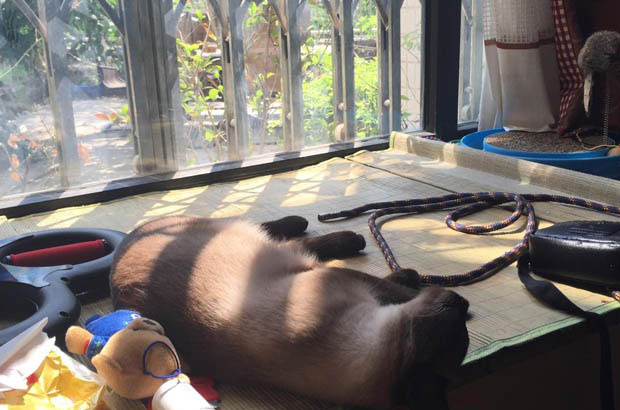Beyond their striking appearance and rich history, Siamese cats are celebrated for their vibrant personalities that blend passion, intelligence, and deep loyalty. Often described as “fire with fur,” these feline companions demand attention, thrive on companionship, and offer a love that is both intense and heartwarming. However, their unique needs require responsible ownership to ensure their health and happiness.
A Personality Like No Other: Passionate, Loyal, and Unapologetically Themselves
Siamese cats are not for the faint of heart. Their personalities are as bold as their pointed coats, characterized by:
Intense Devotion: They form deep, almost obsessive bonds with their owners. A Siamese will follow you from room to room, demand constant interaction, and even sleep beside you, often draping themselves across your chest or pillow. “They don’t just live with you—they inhabit your life,” says cat behaviorist Dr. Lily Chen.
Vocal Virtuosity: Unlike many breeds, Siamese “talk” constantly. Their vocalizations range from soft chirps to loud, insistent meows that resemble a child’s cry, especially when they feel ignored. “It’s like having a tiny, furry philosopher who insists on debating every life choice,” jokes owner Mark Thompson.

Dog-Like Antics: Leash training? No problem. Fetch? They excel at it. Siamese are famously adaptable, often mimicking canine behaviors. They’ll greet you at the door, walk on a leash, and even learn tricks like “roll over” or “fetch,” driven by their desire to please and interact.
The Dark Side of Devotion: The Risks of Loneliness
While their loyalty is endearing, it also makes Siamese highly susceptible to separation anxiety. Studies show that prolonged isolation can lead to:
Depressive Behavior: Loss of appetite, lethargy, and excessive grooming (often leading to bald patches).
Destructive Habits: Scratching furniture, knocking over objects, or even self-harm in extreme cases.
Medical Complications: Chronic stress weakens their immune system, increasing risks of urinary tract infections and respiratory issues.
“Siamese thrive in households where someone is home most of the time,” advises veterinarian Dr. Carlos Rodriguez. “They’re not just pets—they’re emotional partners. If your lifestyle is constantly on the go, consider adopting a more independent breed.”
Intelligence and Trainability: The Brains Behind the Beauty
Siamese cats are among the most intelligent feline breeds, with problem-solving skills that rival those of dogs. This intelligence manifests in:
Rapid Learning: They master litter training and basic commands in days, not weeks. Owner Sarah Lee taught her Siamese, Mimi, to retrieve her slippers in under a month.
Curiosity-Driven Exploration: They’ll open cupboards, solve puzzle feeders, and even turn on faucets in search of adventure. “It’s like living with a tiny, furry Houdini,” laughs Lee.
Emotional Intelligence: Siamese often sense their owners’ moods, offering comfort during sadness and playfulness during joy. “My Siamese, Leo, always knows when I need a hug,” says writer Emma Carter.
Health Considerations: Nurturing a Long, Vibrant Life
While Siamese are generally robust, their genetic legacy carries specific health risks:
Urinary Tract Issues: Their kidneys are prone to stones and infections. Encouraging water intake (through wet food or fountains) and regular vet check-ups are crucial.
Genetic Eye Disorders: Historically, Siamese faced challenges like strabismus (crossed eyes) and nystagmus (eye tremors). Modern breeding has reduced these issues, but progressive retinal atrophy (PRA) remains a concern in some lines.
Skeletal Anomalies: Tail kinks and joint stiffness can occur, though most are harmless. Regular exercise and a balanced diet help maintain mobility.
Dr. Rodriguez emphasizes, “Preventive care is key. Annual check-ups, a high-quality diet, and mental stimulation can keep your Siamese thriving well into their teens.”
A Love That Demands Commitment: Is a Siamese Right for You?
Owning a Siamese is a lifelong partnership. They require:
Time: At least 2–3 hours of interactive play daily to prevent boredom.
Patience: Their vocal nature and curiosity can be overwhelming for first-time owners.
Devotion: They’ll be your shadow, your confidant, and your tiny tyrant—all in one.
But the rewards are immeasurable. As actress and Siamese owner Jane Smith puts it, “Yes, they’re high-maintenance. Yes, they’ll wake you at 3 a.m. with their midnight philosophizing. But the moment they curl into your lap, purring like a motorboat, you’ll realize: there’s no love more honest, more intense, than that of a Siamese.”
Final Thoughts: A Breed Like No Other
From their origins in Thai palaces to their status as beloved companions worldwide, Siamese cats are a testament to the profound bond between humans and animals. Their “flaws”—their neediness, their vocalizations, their genetic quirks—are what make them unique. They’re not just cats; they’re firecrackers of personality, demanding to be seen, heard, and loved unconditionally.
So, if you’re ready for a lifetime of chatter, chaos, and unwavering devotion, open your home to a Siamese. Just remember: keep the water bowls full, the toys plentiful, and the hugs frequent. And whatever you do, don’t let them become the next Guinness World Record holder for “fattest cat”—their health (and dignity) depend on it!
Leave a Reply